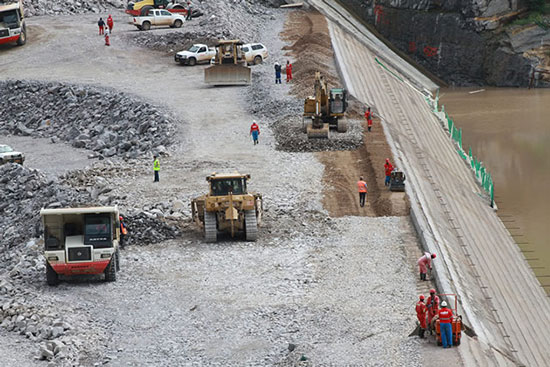


FOR the umpteenth time, construction of the country’s largest inland water reservoir, Tokwe-Murkosi Dam, has stalled due to non-payment of the contractor, Salini-Impregilo Joint Venture. Work at the site started in 1998, but was suspended in 1999 due to lack of funds. Construction resumed in 2001 but went through a stop-start process until 2005. Treasury later allocated funds for the project during the inclusive government era in 2010.
While completion was earmarked for December 31, 2013, authorities again shifted the date to April this year, before pushing it to August.
But the target seems elusive now, judging from recent developments. Since March this year, construction was going at a snail’s pace due to lack of resources, chief among them fuel. At a recent tour of the dam site by a three-member Cabinet committee headed by Local Government Minister, Ignatius Chombo, Tokwe-Murkosi Dam resident engineer, Paul Dengu, said government owes Salini-Impregilo Joint Venture, an Italian company, US$70 million.
“The government is in arrears of US$70 million to Salini and this has affected work here,” said Dengu. He said construction had been slow due to resource constraints. “We had no fuel, so there was no construction going on. Resources are trickling in here and there,” he said. “Sometimes we work slowly. Sometimes we do not due to lack of resources.”
And only recently, Stephen Muza, a representative of the Italian company contracted by government to build the dam told the media that construction had finally stalled due to lack of funds. “There has been an agreement with workers that they temporarily go back to their homes and they would be recalled when funds are available,” Muza said.
An estimated 300 workers at the dam site have already been put on hold, sources said. Some of the workers are seen roaming the streets and night spots in Masvingo whiling away time. Engineers who spoke on condition of anonymity said the stoppage would be costly as it means that when construction finally resumes, they would have to revisit some of the things that they would have done.
But there is no clear sign as yet that government — faced with a bloated civil servants wage bill against a backdrop of dwindling income into the fiscus — will pump in money into the project. Government is presently battling to feed scores of families at Chingwizi camp after they were relocated from the Tokwe Murkosi area following heavy rains earlier this year in Masvingo’s Chivi district.
Finance Minister, Patrick Chinamasa, has been tasked by government to scrounge around for US$9 million to compensate flood survivors crammed at Chingwizi holding camp in a bid to de-congest the facility and end a humanitarian disaster that is in the making. Construction at the dam was also affected by delays by government to relocate 18 000 villagers who were in the dam basin as they wanted compensation first before moving.
The villagers only moved after a flooding disaster in February that saw their homes, livestock and property being destroyed by the massive waves. They were moved to Chingwizi in Nuanetsi Ranch where there is a fair share of problems owing to the inhabitable conditions as well as food shortages.
Apart from the flooding disaster, the dam wall breached and there was seepage, raising fears of flooding downstream that sent shock waves as far as Mozambique where a delegation from the neighbouring country came to assess the damage to the dam wall. Whenever it will be completed — if it will ever be in our lifetime — Tokwe-Murkosi, with a holding capacity of 1,8 billion cubic metres and spreading over 9 600 hectares of flood area, is set to irrigate 25 000 hectares of mainly sugarcane. — Own Correspondent
newsdesk@fingaz.co.zw